Endoxan (Cyclophosphamide) 50mg 100’ct Tablets In Pakistan
Endoxan (Cyclophosphamide) 50mg Tablets Overview
What is Endoxan?
Endoxan is a medication containing cyclophosphamide, an alkylating agent used primarily in chemotherapy for various types of cancer and certain autoimmune conditions.
Indications
- Cancer Treatment: Effective against lymphomas, leukemias, and solid tumors.
- Nephrotic Syndrome: Used in children when other treatments fail.
Dosage and Administration
- Typical Dosage: Ranges from 100-300 mg daily, either as a single dose or divided doses.
- Monitoring: Regular blood count and organ function tests are essential during treatment.
Mechanism of Action
Cyclophosphamide works by interfering with the DNA synthesis of rapidly dividing cells, leading to cell death, particularly in cancerous cells.
Safety and Precautions
- Caution: Use in patients with liver or kidney disease should be closely monitored.
- Hydration: Increased fluid intake is recommended to minimize the risk of bladder toxicity.
Packaging and Availability
- Formulation: Available as 50mg tablets.
- Pack Size: Typically sold in packs of 100 tablets.
- Availability in Pakistan: Can be found at pharmacies and online retailers; prices may vary.
-
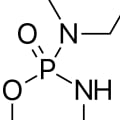
Original price was: ₨6,500.00.₨5,500.00Current price is: ₨5,500.00.
Description
Endoxan (Cyclophosphamide) 50mg Tablets Overview
What is Endoxan?
Endoxan is a medication containing cyclophosphamide, an alkylating agent used primarily in chemotherapy for various types of cancer and certain autoimmune conditions.
Indications
- Cancer Treatment: Effective against lymphomas, leukemias, and solid tumors.
- Nephrotic Syndrome: Used in children when other treatments fail.
Dosage and Administration
- Typical Dosage: Ranges from 100-300 mg daily, either as a single dose or divided doses.
- Monitoring: Regular blood count and organ function tests are essential during treatment.
Mechanism of Action
Cyclophosphamide works by interfering with the DNA synthesis of rapidly dividing cells, leading to cell death, particularly in cancerous cells.
Safety and Precautions
- Caution: Use in patients with liver or kidney disease should be closely monitored.
- Hydration: Increased fluid intake is recommended to minimize the risk of bladder toxicity.
Packaging and Availability
- Formulation: Available as 50mg tablets.
- Pack Size: Typically sold in packs of 100 tablets.
- Availability in Pakistan: Can be found at pharmacies and online retailers; prices may vary.
Key Benefits of Endoxan (Cyclophosphamide) 50mg Tablets
- Cancer Treatment: Endoxan is effective in treating various malignancies including:
- Malignant lymphomas (e.g., Hodgkin’s disease, Burkitt’s lymphoma)
- Leukemias (e.g., chronic lymphocytic leukemia, acute lymphoblastic leukemia)
- Solid tumors (e.g., breast carcinoma, ovarian cancer, neuroblastoma) .
- Immunosuppressive Properties: It is beneficial for treating autoimmune disorders by suppressing the immune system, which helps manage conditions like nephrotic syndrome in children when other treatments have failed .
- Versatile Usage: Endoxan can be used alone or in combination with other chemotherapy agents, enhancing its effectiveness against resistant cancers .
- Cytotoxic Action: The drug works by damaging the DNA of rapidly dividing cells, thereby inhibiting their growth and proliferation .
Key Ingredients
- Active Ingredient: Cyclophosphamide
- Classification: Alkylating agent
- Mechanism of Action: Cyclophosphamide forms covalent bonds with DNA, leading to cross-linking of DNA strands, which disrupts replication and transcription in cancer cells .
Mechanism of Action of Endoxan (Cyclophosphamide) 50mg Tablets
Endoxan (cyclophosphamide) functions primarily as an alkylating agent, which is crucial in its role as a chemotherapy drug. Here’s how it works:
DNA Interaction
- Covalent Bond Formation: Cyclophosphamide is metabolized in the body to form active metabolites that bind covalently to DNA. This binding leads to the cross-linking of DNA strands, which prevents the strands from separating during cell division.
- Inhibition of Replication: The cross-linking of DNA inhibits replication and transcription processes, effectively halting the growth and proliferation of rapidly dividing cancer cells. This action is particularly effective against malignant cells, which are characterized by uncontrolled division.
Immunosuppressive Effects
- Immune System Suppression: In addition to its anticancer properties, cyclophosphamide suppresses the immune system by affecting lymphocytes, which are white blood cells involved in immune responses. This immunosuppressive effect is beneficial in treating autoimmune disorders, such as nephrotic syndrome in children, where an overactive immune response is detrimental.
Cell Cycle Activity
- Cell Cycle Phase: Cyclophosphamide can act on cells at any phase of the cell cycle, making it versatile in targeting various types of cancer cells that may be at different stages of division.
 CyclophosphamideChemotherapy medication and immune system suppressorMoreUse CasesTreats lymphoma, multiple myeloma, leukemia, ovarian cancer, breast cancer, small cell lung cancer, neuroblastoma, sarcoma; suppresses immune system in conditions like nephrotic syndrome, granulomatosis with polyangiitis, and post organ transplantAdministrationOrally or by injection into a veinCommon Side EffectsLow white blood cell counts, loss of appetite, vomiting, hair loss, bleeding from the bladderThe chemical structure of cyclophosphamide, the active ingredient in Endoxan 50mg Tablets, is:\begin{array}{c}\ce{Cl-CH2-CH2-N(CH2-CH2-Cl)2|CH2-CH2-O-P(=O)(OH)-NH2}\end{array}
CyclophosphamideChemotherapy medication and immune system suppressorMoreUse CasesTreats lymphoma, multiple myeloma, leukemia, ovarian cancer, breast cancer, small cell lung cancer, neuroblastoma, sarcoma; suppresses immune system in conditions like nephrotic syndrome, granulomatosis with polyangiitis, and post organ transplantAdministrationOrally or by injection into a veinCommon Side EffectsLow white blood cell counts, loss of appetite, vomiting, hair loss, bleeding from the bladderThe chemical structure of cyclophosphamide, the active ingredient in Endoxan 50mg Tablets, is:\begin{array}{c}\ce{Cl-CH2-CH2-N(CH2-CH2-Cl)2|CH2-CH2-O-P(=O)(OH)-NH2}\end{array}Key features of the structure:
- It contains two 2-chloroethyl groups attached to a central nitrogen atom, forming an alkylating agent.
- The phosphoramide group is responsible for the drug’s cytotoxic effects.
- The cyclical structure gives the drug its name.
The chemical formula of cyclophosphamide is C7H15Cl2N2O2P, with a molecular weight of 279.1 g/mol.Cyclophosphamide is an alkylating agent that interferes with DNA replication, leading to cell death, particularly in rapidly dividing cancer cells. Its unique structure allows it to cross-link DNA strands, preventing cell division and growth.
cyclophosphamide, the active ingredient in Endoxan 50mg Tablets, can interact with several common medications:
- Adriamycin (doxorubicin): Increased risk of cardiotoxicity when used together
- Bactrim (sulfamethoxazole / trimethoprim): Increased risk of myelosuppression
- Lasix (furosemide): Increased risk of bladder toxicity
- Neulasta (pegfilgrastim): Increased risk of myelosuppression
- Tylenol (acetaminophen): Increased risk of hepatotoxicity
- Azathioprine: Increased risk of myelosuppression
- Etanercept: Increased risk of infection
- Turmeric (curcumin): Potential for increased toxicity
- Voclosporin: Increased risk of nephrotoxicity
Some key points about cyclophosphamide interactions:
- It can interact with a wide range of medications, including antibiotics, antidepressants, antifungals, and immunosuppressants
- Interactions can increase the risk of serious side effects like myelosuppression, cardiotoxicity, and bladder toxicity
- Patients should provide a complete medication list to their doctor and pharmacist to check for potential interactions
- Certain interactions may require dose adjustments or more frequent monitoring
Medications to Avoid
- Nonsteroidal Anti-Inflammatory Drugs (NSAIDs):
- Examples: Aspirin, ibuprofen, naproxen, ketoprofen.
- Reason: These can mask fever, which is important to monitor due to cyclophosphamide’s immunosuppressive effects, and may increase the risk of bleeding and kidney toxicity.
- Live Vaccines:
- Examples: Measles, mumps, rubella (MMR), nasal flu vaccine.
- Reason: Cyclophosphamide can weaken the immune response, making live vaccines less effective and increasing the risk of infection from the vaccine itself.
- Immunosuppressive Agents:
- Examples: Etanercept, apalutamide.
- Reason: Concurrent use can increase the risk of severe infections and may diminish the therapeutic effects of vaccines.
- Deferiprone:
- Reason: This medication can increase the toxicity of cyclophosphamide, particularly the risk of neutropenia (low white blood cell count) .
- Other Chemotherapy Agents:
- Examples: Certain combinations with other chemotherapy drugs should be approached with caution.
- Reason: Increased risk of cumulative toxicity and enhanced side effects.
General Precautions
- Always inform your healthcare provider about all medications, supplements, and herbal products you are taking.
- Regular monitoring and communication with your healthcare team are essential to manage potential interactions effectively.
Cyclophosphamide can significantly affect immunizations and vaccines due to its immunosuppressive properties. Here are the key interactions:
Live Vaccines
- Avoid Live Vaccines: Patients receiving cyclophosphamide should avoid live vaccines, such as the nasal flu vaccine and MMR (measles, mumps, rubella) vaccine. The immunosuppressive effects of cyclophosphamide can lead to an increased risk of infections from live vaccines, as the immune response may be inadequate to protect against these pathogens.
Inactivated Vaccines
- Reduced Efficacy: While inactivated vaccines (like the injectable flu vaccine) can be administered, cyclophosphamide may reduce their effectiveness. The immune response to these vaccines might be compromised, leading to suboptimal protection against the diseases they are meant to prevent.
Recommendations
- Consult Healthcare Providers: It is crucial for patients on cyclophosphamide to inform their healthcare providers about their medication regimen before receiving any vaccinations. Healthcare providers may recommend delaying vaccinations until the patient’s immune system has recovered, particularly after completing treatment with cyclophosphamide.
Key Precautions for Cyclophosphamide
- Infection Risk: Cyclophosphamide can lower white blood cell counts, increasing the risk of infections. Patients should avoid close contact with individuals who have contagious illnesses and should report any signs of infection to their healthcare provider immediately.
- Vaccination Considerations: Patients should avoid live vaccines while on cyclophosphamide, as the immunosuppressive effects can lead to inadequate immune responses or infections from the vaccine itself. It’s essential to inform healthcare providers about cyclophosphamide use before receiving any vaccinations.
- Surgical Precautions: Notify doctors and dentists about cyclophosphamide treatment before any surgery or dental procedures, as it may affect bleeding risk and recovery.
- Hydration: To minimize the risk of bladder toxicity, patients should maintain high fluid intake (at least 2 liters per day) during and for a few days after treatment. This helps flush the drug from the system and reduce the risk of hemorrhagic cystitis.
- Monitoring: Regular monitoring of blood counts and organ function is crucial. Patients should have frequent check-ups to assess for potential side effects and adjust treatment as necessary.
- Allergy Awareness: Patients should inform their healthcare provider of any known allergies, particularly to other chemotherapy agents, to avoid adverse reactions.
- Pregnancy and Fertility: Cyclophosphamide may harm an unborn baby and can affect fertility. Both men and women should discuss reliable birth control methods with their healthcare provider during treatment and for a specified time after treatment ends.
- Avoiding Sharp Objects: To reduce the risk of cuts or bruises, patients should exercise caution when using sharp objects and avoid contact sports.
Dietary Restrictions
- Fluid Intake: Increased fluid consumption is essential to prevent urinary complications. Patients are advised to drink plenty of water and fluids while on cyclophosphamide.
- Small, Frequent Meals: Eating several small meals throughout the day may help manage side effects such as nausea and improve overall tolerance to the medication.
- Alcohol Consumption: Patients should discuss alcohol use with their healthcare provider, as it may exacerbate side effects or interact with the medication.
- Avoid Certain Foods: While specific food restrictions are not universally defined, patients should be cautious about foods that may irritate the bladder or gastrointestinal tract, especially during treatment.
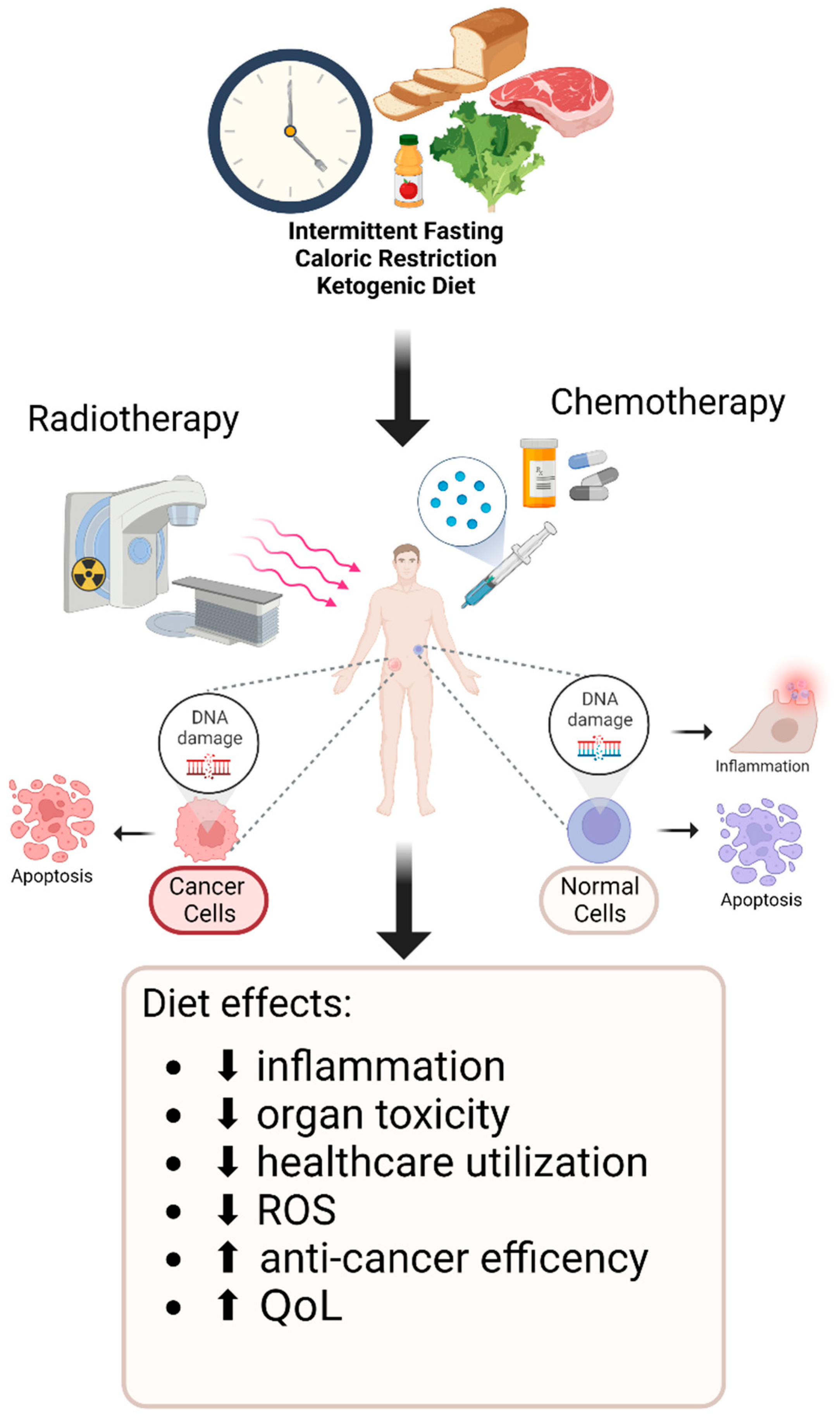
Use During Pregnancy
- Contraindicated: Cyclophosphamide is known to cause fetal harm, including malformations, miscarriage, and growth retardation. It is classified as a pregnancy category D drug, indicating evidence of risk to the fetus based on animal studies and its mechanism of action.
- Teratogenic Effects: Exposure during pregnancy may lead to various congenital abnormalities and toxic effects in newborns, such as leukopenia and anemia.
Use During Breastfeeding
- Contraindicated: Cyclophosphamide is excreted in breast milk in potentially harmful amounts, which can pose risks to nursing infants, including neutropenia and other adverse effects.
- Impact on Milk Composition: The drug can alter the normal microbiome and chemical makeup of breast milk, further complicating the safety of breastfeeding during treatment.
Recommendations
- Avoidance: Women who are pregnant or planning to become pregnant should avoid cyclophosphamide, and breastfeeding mothers should not breastfeed while receiving this medication.
- Consultation: It is essential for women of reproductive age to discuss effective contraception methods with their healthcare providers while undergoing treatment and for a period after therapy.
safest medications to take during pregnancy:
Allergy Medications
- Diphenhydramine (Benadryl)
- Loratadine (Claritin)
- Steroid nasal sprays like Rhinocort
Pain Relievers
- Acetaminophen (Tylenol)
- Considered the drug of choice for pain during pregnancy
- Limit dose and duration of use
Heartburn Medications
- Antacids like Gaviscon, Maalox, Mylanta, Rolaids, Tums
- H2 blockers like Pepcid, Tagamet, Zantac
Constipation Treatments
- Stool softeners like Colace or Surfak
- Fiber supplements like Metamucil
- Laxatives like Milk of Magnesia, Senokot, Dulcolax
- Consult doctor before using
Morning Sickness Remedies
- Vitamin B6 (pyridoxine)
- Doxylamine succinate (Unisom)
- Diclegis (doxylamine succinate-pyridoxine hydrochloride)
Hemorrhoid Treatments
- Witch hazel pads like Tucks
- Hydrocortisone creams
- Preparation H
Yeast Infection Medications
- Miconazole (Monistat)
- Clotrimazole
Dosage of Endoxan (Cyclophosphamide) 50mg Tablets
The typical dosage of Endoxan 50mg tablets varies depending on the indication and patient response:
- Continuous treatment: 1 – 4 tablets (50 – 200 mg) per day
- More tablets can be taken if needed
- The duration of therapy and intervals between courses depend on the indication, combination therapy, patient health, blood counts, and recovery
For patients with renal or hepatic impairment, dose reduction is recommended:
- Reduce dose by 25% when serum bilirubin is 3.1-5 mg/100 mL
- Reduce dose by 50% when glomerular filtration rate is less than 10 mL/min
Storage of Endoxan 50mg Tablets
- Store at a temperature below 30°C (86°F)
- Protect from direct sunlight and humidity above 70%
- Check expiration date before using to avoid side effects
Patient Reviews
Endoxan 50mg tablets are an effective chemotherapy medication, but reviews highlight the need for careful management:
- “The medication helped treat my cancer, but the side effects like nausea and hair loss were difficult to deal with.”
- “My doctor closely monitored my blood counts and adjusted the dosage when needed. Communication with the healthcare team was key.”
- “Staying hydrated and avoiding infections were important during treatment. Support from family and friends made a big difference.”
- Cancer Treatment: Endoxan is effective in treating various malignancies including:

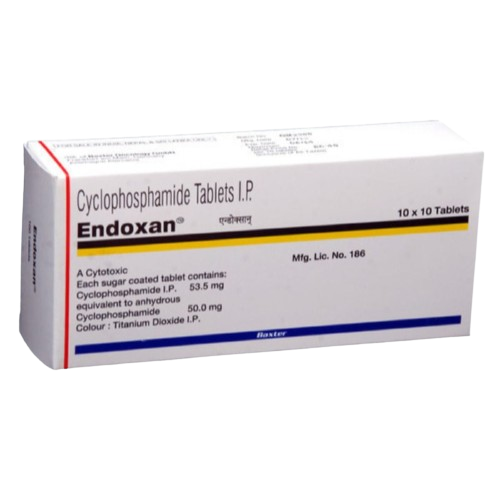

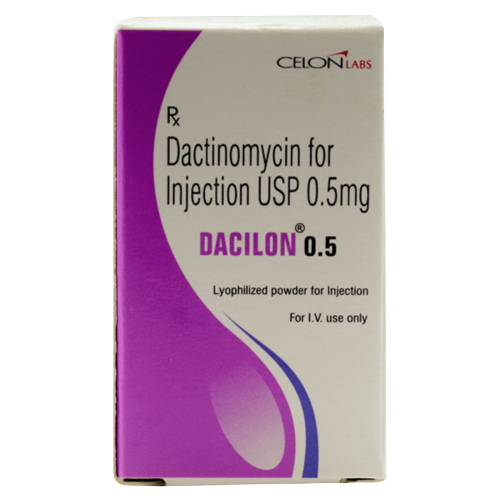
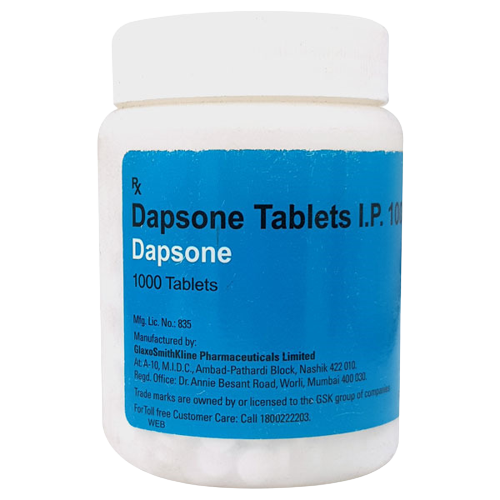

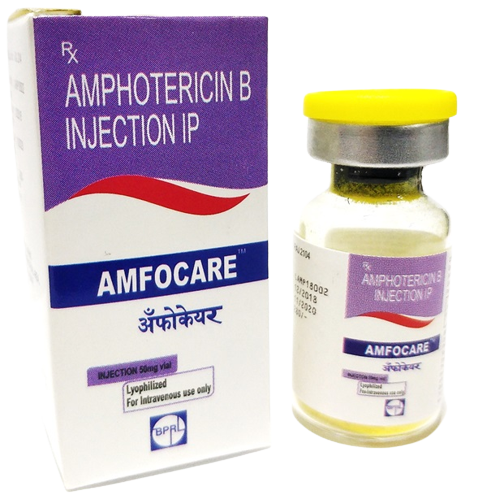

Reviews
There are no reviews yet.